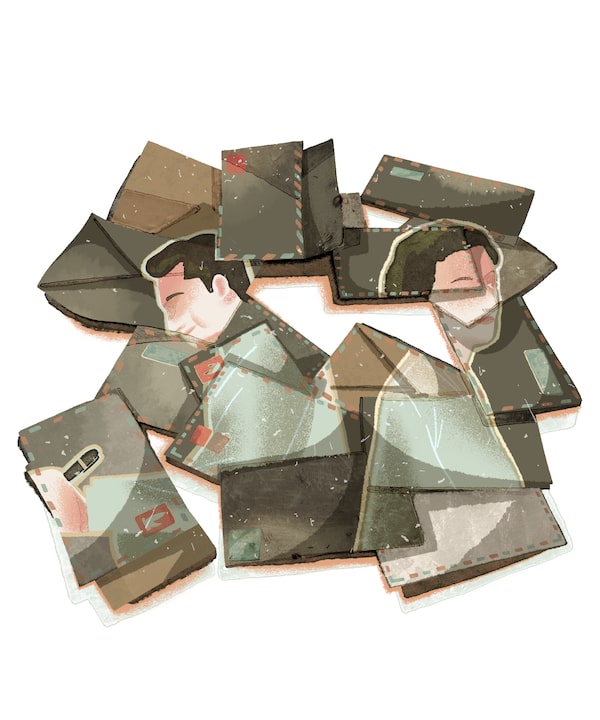First Person is a daily personal piece submitted by readers. Have a story to tell? See our guidelines at tgam.ca/essayguide.

Illustration by Rachel Wada
Stories of lovers separated by COVID-19 lockdowns remind me of my English mother and Dutch father during the Second World War. Joyce and Andrew met in 1937 when they were both holidaying in the Swiss Alps. Their mutual attraction deepened when my father visited England in the two following years. They wrote each other frequent letters, signed at first simply with “Yours,” but later “With all my love.”
After war was declared between Britain and Germany in September, 1939, postal service to and from the Netherlands became erratic. My parents started numbering each envelope so they could track which were lost or delayed by months. Censors often opened the letters, painting stripes of blue wash over the paper to detect invisible ink and noting the censor’s identification number in pencil at the top. Joyce was upset that others could read about her deepest personal feelings, but Andrew took a more lighthearted approach. Realizing that a number of exchanges had passed through the hands of Censor 1663, he imagined the man must be compiling a collection of their love letters.
Life during the war was not easy for either of them. Trade dried up and Andrew was furloughed by his Amsterdam import/export company. He found work with a public utilities group in The Hague, but commuting by train was slow, crowded and unreliable. His mother exhausted herself lining up all day with coupons to buy the food needed for an extended family of six. Joyce was also subject to rationing in London where she worked as a radiographer (x-ray technician) at Barts Hospital. When she wrote my father about restrictions on butter, he arranged to send her family a kilo of Dutch butter through the post.
In their letters, my parents debated the relative merits of eventually making a life together in the United Kingdom or in the Netherlands. Joyce started to study Dutch from a book so she would be able to communicate with my father’s family; then she took lessons from the wife of a minister in the Dutch government-in-exile. Andrew meanwhile was studying English to the level where he would be qualified to teach high school; later he also qualified as a translator.
Desperate to see each other again, they made plans for Joyce to visit neutral Holland in June, 1940. Just weeks before she was to leave, the Netherlands was overrun during the Blitzkrieg and occupied by German forces. For the next five years, my parents lived 400 kilometres apart, separated not so much by the North Sea as by war.
For four months after the surrender of Holland, they had no news of each other at all. Eventually, communication was possible through the Red Cross which provided special forms for 25-word personal messages. Later they managed to send letters through a Red Cross postbox in Lisbon or via an acquaintance in Zurich who sometimes added his own cheery greetings at the bottom of their personal notes. Though texts were still censored, my father used certain code words. “Violins” meant radio sets, strictly controlled by the Germans who had outlawed listening to English newscasts and “Ben” stood for the BBC. “My brother and his wife brought me a violin to borrow as they each had one of their own,” my father wrote. “I am often practising with Ben.”
In May, 1945, after months of disruption, the war in Europe ended. Joyce sent Andrew two long letters full of her plans. The Dutch government had agreed to send her to Holland “very, very soon” to assist in mass x-ray screening of the population for tuberculosis. (The Dutch had suffered appallingly from famine in the winter of 1944-45 and were at great risk of tuberculosis. Like others during that winter, my father had tried eating tulip bulbs though he found them “nauseating after the first few.”)
To my mother’s dismay, her two letters were returned marked “No service.” She had not had any word from Andrew in months though she had asked five or six friends or acquaintances who were going to Holland to try to look up Andrew and pass on news. Despite her worry that she was making a fool of herself, she bravely sent off a telegram announcing her expected arrival date. My father was overjoyed and went to the airport to welcome her with precious strawberries and cherries, but found no Joyce: her papers had not come through in time. Fortunately, he met a sympathetic RAF officer who agreed to serve as a go-between and carry letters to and fro.
It was not until July, 1945 that my mother finally landed in Eindhoven, her duty station, which happened to be where my father was working at the time. Even after he was transferred back to Amsterdam, my mother managed to visit him by hitching rides with Canadian military vehicles, sitting on soldiers’ laps up in the cab and bluffing her way through military checkpoints by showing her radiographer’s papers.
In June, 1946, my father and mother were married in England and took up residence in Amsterdam. Six years later, they and their two little children (my brother and myself) boarded a ship to Africa where my father had been offered a managerial position with his old trading company. As the Cold War grew bitter in the fifties, many thought that hostilities might break out again in Europe, this time between the Soviet Union and the Western democracies led by the United States. At least in Africa, my parents needed never fear being separated again by war.
Elizabeth Davies lives in Ottawa.
Sign up for the weekly Parenting & Relationships newsletter for news and advice to help you be a better parent, partner, friend, family member or colleague.